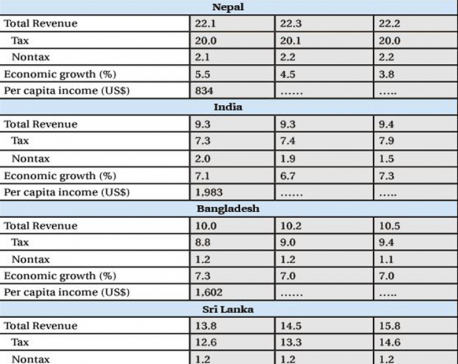
OR
Community forests face 65% tax burden
Published On: February 13, 2019 08:00 AM NPT By: Republica | @RepublicaNepal
KATHMANDU, Feb 13: The community forestry program in Nepal helped significantly increase Nepal’s forest cover which was steadily declining due to deforestation, encroachment and haphazard cutting down of trees back in the early 1990s. But the same initiative launched by the local people voluntarily has now fallen into a serious trouble as this has been the target of all governments — local, provincial and federal — as the main source of their revenue.
If the taxes imposed by these three tiers of government under the federal setup are taken into consideration, community forestry groups will have to pay as much as 65 percent of their total income to different tiers of the governments under various tax headings.
There are around 22,000 community forest user groups (CFUGs). While each such group is required to pay 28 percent - including 13 percent Value Added Tax (VAT) - of their total income to a Federal Consolidated Fund, they have been asked to pay 10 percent of their income to their respective local government as per the Nepal Act Amendment Bill, which was endorsed by the lower house on Tuesday.
Recently, Province 3 government decided to collect 25 percent of the total income of the forest users’ groups for the the Provincial Consolidated Fund, and levy an additional two percent of their income as Provincial Service Tax. There are fears that other provincial governments will also impose similar taxes on community forest user groups, taking cue from the Province 3 government.
“If you take into account the taxes that community forest user groups have to pay, this exceeds 65 percent. Nowhere in the world has such high amount of taxes been levied,” said Chairperson of the Federation of Community Forest Users’ Nepal (Fecofun) Bharati Pathak.
Pathak claimed that only about 300 of the total over 22,000 forest user groups earn more than Rs 10 million a year. “Most users’ groups are not in a position to pay such huge amount of taxes. This leaves us with no option but to take to the streets against this duplication of taxes,” she further said.
As per the constitutional provisions, the Natural Resource and Fiscal Commission is supposed to distribute revenue collected by the federal government to the provincial and local governments. While the federal government is supposed to keep 50 percent of the revenue to itself, the remaining 50 percent is to be distributed equally to the provincial and local governments.
Fecofun officials said they are not against paying tax to the government, but are against the duplication of taxes by the federal, provincial and local governments. They have demanded that the government agencies concerned address their demand to avoid duplication of taxes.
Nepal’s community forest initiative has helped significantly increase forest cover in the country since it was launched in the early 1990s. A five-year survey conducted by the Department of Forest Research and Survey (2010 to 2014) had earlier showed that Nepal’s forest cover had increased to 44.74 percent, up from 39.6 in late 1990s.
You May Like This

UML leader Basnet to Balen: Don't be pampered just because you have a few hundred fans on Facebook
KATHMANDU, August 26: While the Mayor of Kathmandu Metropolitan City (KMC), Balendra Shah, is speeding up the work to demolish... Read More...

Complete education, full health could double Nepal's GDP per capita: WB
KATHMANDU, June 7: Nepal has the potential to double its Gross Domestic Product (GDP) per capita in the long run if... Read More...

Tax exploitation in Nepal
High taxation policy pursued by Nepal has worked as a powerful drag on the economy by hurting private sector incentive... Read More...






Just In
- Challenges Confronting the New Coalition
- NRB introduces cautiously flexible measures to address ongoing slowdown in various economic sectors
- Forced Covid-19 cremations: is it too late for redemption?
- NRB to provide collateral-free loans to foreign employment seekers
- NEB to publish Grade 12 results next week
- Body handover begins; Relatives remain dissatisfied with insurance, compensation amount
- NC defers its plan to join Koshi govt
- NRB to review microfinance loan interest rate











Leave A Comment